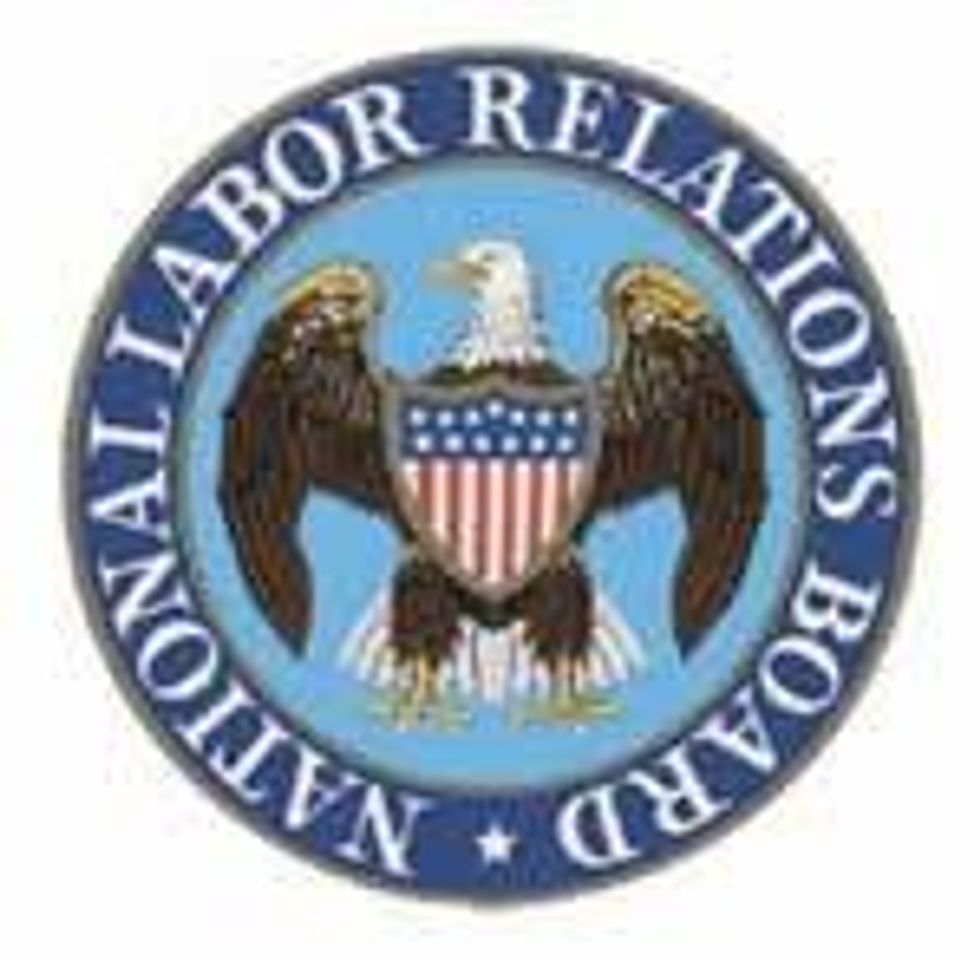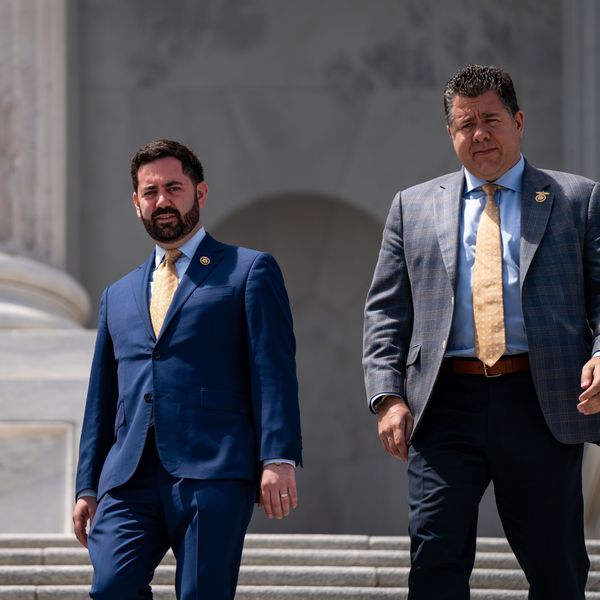The NLRB Under Assault
Republicans Declare War on the Working Class
If organized labor were to list the three worst things that could happen to it, one of them would surely be having the NLRB (National Labor Relations Board, established in 1935) close up shop. While the NLRB hasn't always performed to labor's satisfaction (indeed, its reluctance to act has been the source of consternation and heartburn), it has, nonetheless, proven itself indispensable.

Yet, as critically important as the NLRB is, there's a chance it will be put out of business come the first of the year. Due to a 2010 ruling by the Supreme Court, unless the 5-member NLRB has a quorum (i.e., a minimum of three members), it is illegal for it to hand down decisions. In other words, unless there are at least three members present, the NLRB has no power to stop management from violating federal labor law. They can violate it with impunity. Without the NLRB, employees could vote overwhelmingly to join a union, and the company could simply ignore them. Who's to stop them?
Here's how it stands. Republicans have not only steadfastly refused to confirm President Obama's appointees (leaving the Board without a quorum), but they have threatened to strip the Board of its operating budget, basically wiping it out. No money, no NLRB. Incredibly, with the whole country watching from the sidelines--with unemployment still high and the gap between rich and poor continuing to widen--the Republican Party has audaciously and fearlessly declared war on America's working class.
As gutless as President Obama has been in regard to labor (e.g., backing away from the EFCA, abandoning striker replacement legislation, failing to respond to attacks on the teachers' union, et al), he's been caught in the middle of this NLRB deal. On the one hand, by nominating solidly pro-union people to the Board he has acceded to organized labor demands, but on the other hand, he has energized and mobilized Republican opposition.
In truth, this is a bit of a false dichotomy. After all, is it not Obama's job to behave like a traditional, pro-labor Democrat? If anything, he has been woefully derelict in that regard. Also, despite the Republican's hysterical smear campaign, we shouldn't allow them to pretend that the people Obama has nominated are "radicals." In the 1960s and 1970s these same folks would have been considered "enlightened centrists," plain and simple. And in the 1940s, they would've been considered "pro-business."
Unfortunately, some nominal "pro-labor" activists have publicly criticized Obama for not being more accommodating, for not being more pragmatic, more practical. They've criticized him for failing to appoint Board members who would automatically appeal to the Republicans, as if it were Obama's job to abandon America's working class in order to please John Boehner and his corporate sponsors.
But let's be honest. If the Republican Party had its way, there would be no NLRB, no OSHA (Occupational Safety and Health Administration), and, very likely, no Department of Labor. What prevented the elimination of those agencies was America's political landscape. Those agencies were viewed as overwhelmingly beneficial. But, alas, the contour of the landscape has changed.
In the 1970s the Republican Party wouldn't have dared suggest, not in its wildest dreams, that the NLRB and OSHA be dismantled. For one thing, it was a Republican administration that created OSHA. Considering the country's mood at the time, coupled with organized labor's influence, along with, arguably, the respect that working people still enjoyed, eliminating the Labor Board would have been considered, among other things, "unpatriotic."
An Urgent Message From Our Co-Founder
Dear Common Dreams reader, The U.S. is on a fast track to authoritarianism like nothing I've ever seen. Meanwhile, corporate news outlets are utterly capitulating to Trump, twisting their coverage to avoid drawing his ire while lining up to stuff cash in his pockets. That's why I believe that Common Dreams is doing the best and most consequential reporting that we've ever done. Our small but mighty team is a progressive reporting powerhouse, covering the news every day that the corporate media never will. Our mission has always been simple: To inform. To inspire. And to ignite change for the common good. Now here's the key piece that I want all our readers to understand: None of this would be possible without your financial support. That's not just some fundraising cliche. It's the absolute and literal truth. We don't accept corporate advertising and never will. We don't have a paywall because we don't think people should be blocked from critical news based on their ability to pay. Everything we do is funded by the donations of readers like you. Will you donate now to help power the nonprofit, independent reporting of Common Dreams? Thank you for being a vital member of our community. Together, we can keep independent journalism alive when it’s needed most. - Craig Brown, Co-founder |
If organized labor were to list the three worst things that could happen to it, one of them would surely be having the NLRB (National Labor Relations Board, established in 1935) close up shop. While the NLRB hasn't always performed to labor's satisfaction (indeed, its reluctance to act has been the source of consternation and heartburn), it has, nonetheless, proven itself indispensable.

Yet, as critically important as the NLRB is, there's a chance it will be put out of business come the first of the year. Due to a 2010 ruling by the Supreme Court, unless the 5-member NLRB has a quorum (i.e., a minimum of three members), it is illegal for it to hand down decisions. In other words, unless there are at least three members present, the NLRB has no power to stop management from violating federal labor law. They can violate it with impunity. Without the NLRB, employees could vote overwhelmingly to join a union, and the company could simply ignore them. Who's to stop them?
Here's how it stands. Republicans have not only steadfastly refused to confirm President Obama's appointees (leaving the Board without a quorum), but they have threatened to strip the Board of its operating budget, basically wiping it out. No money, no NLRB. Incredibly, with the whole country watching from the sidelines--with unemployment still high and the gap between rich and poor continuing to widen--the Republican Party has audaciously and fearlessly declared war on America's working class.
As gutless as President Obama has been in regard to labor (e.g., backing away from the EFCA, abandoning striker replacement legislation, failing to respond to attacks on the teachers' union, et al), he's been caught in the middle of this NLRB deal. On the one hand, by nominating solidly pro-union people to the Board he has acceded to organized labor demands, but on the other hand, he has energized and mobilized Republican opposition.
In truth, this is a bit of a false dichotomy. After all, is it not Obama's job to behave like a traditional, pro-labor Democrat? If anything, he has been woefully derelict in that regard. Also, despite the Republican's hysterical smear campaign, we shouldn't allow them to pretend that the people Obama has nominated are "radicals." In the 1960s and 1970s these same folks would have been considered "enlightened centrists," plain and simple. And in the 1940s, they would've been considered "pro-business."
Unfortunately, some nominal "pro-labor" activists have publicly criticized Obama for not being more accommodating, for not being more pragmatic, more practical. They've criticized him for failing to appoint Board members who would automatically appeal to the Republicans, as if it were Obama's job to abandon America's working class in order to please John Boehner and his corporate sponsors.
But let's be honest. If the Republican Party had its way, there would be no NLRB, no OSHA (Occupational Safety and Health Administration), and, very likely, no Department of Labor. What prevented the elimination of those agencies was America's political landscape. Those agencies were viewed as overwhelmingly beneficial. But, alas, the contour of the landscape has changed.
In the 1970s the Republican Party wouldn't have dared suggest, not in its wildest dreams, that the NLRB and OSHA be dismantled. For one thing, it was a Republican administration that created OSHA. Considering the country's mood at the time, coupled with organized labor's influence, along with, arguably, the respect that working people still enjoyed, eliminating the Labor Board would have been considered, among other things, "unpatriotic."
If organized labor were to list the three worst things that could happen to it, one of them would surely be having the NLRB (National Labor Relations Board, established in 1935) close up shop. While the NLRB hasn't always performed to labor's satisfaction (indeed, its reluctance to act has been the source of consternation and heartburn), it has, nonetheless, proven itself indispensable.

Yet, as critically important as the NLRB is, there's a chance it will be put out of business come the first of the year. Due to a 2010 ruling by the Supreme Court, unless the 5-member NLRB has a quorum (i.e., a minimum of three members), it is illegal for it to hand down decisions. In other words, unless there are at least three members present, the NLRB has no power to stop management from violating federal labor law. They can violate it with impunity. Without the NLRB, employees could vote overwhelmingly to join a union, and the company could simply ignore them. Who's to stop them?
Here's how it stands. Republicans have not only steadfastly refused to confirm President Obama's appointees (leaving the Board without a quorum), but they have threatened to strip the Board of its operating budget, basically wiping it out. No money, no NLRB. Incredibly, with the whole country watching from the sidelines--with unemployment still high and the gap between rich and poor continuing to widen--the Republican Party has audaciously and fearlessly declared war on America's working class.
As gutless as President Obama has been in regard to labor (e.g., backing away from the EFCA, abandoning striker replacement legislation, failing to respond to attacks on the teachers' union, et al), he's been caught in the middle of this NLRB deal. On the one hand, by nominating solidly pro-union people to the Board he has acceded to organized labor demands, but on the other hand, he has energized and mobilized Republican opposition.
In truth, this is a bit of a false dichotomy. After all, is it not Obama's job to behave like a traditional, pro-labor Democrat? If anything, he has been woefully derelict in that regard. Also, despite the Republican's hysterical smear campaign, we shouldn't allow them to pretend that the people Obama has nominated are "radicals." In the 1960s and 1970s these same folks would have been considered "enlightened centrists," plain and simple. And in the 1940s, they would've been considered "pro-business."
Unfortunately, some nominal "pro-labor" activists have publicly criticized Obama for not being more accommodating, for not being more pragmatic, more practical. They've criticized him for failing to appoint Board members who would automatically appeal to the Republicans, as if it were Obama's job to abandon America's working class in order to please John Boehner and his corporate sponsors.
But let's be honest. If the Republican Party had its way, there would be no NLRB, no OSHA (Occupational Safety and Health Administration), and, very likely, no Department of Labor. What prevented the elimination of those agencies was America's political landscape. Those agencies were viewed as overwhelmingly beneficial. But, alas, the contour of the landscape has changed.
In the 1970s the Republican Party wouldn't have dared suggest, not in its wildest dreams, that the NLRB and OSHA be dismantled. For one thing, it was a Republican administration that created OSHA. Considering the country's mood at the time, coupled with organized labor's influence, along with, arguably, the respect that working people still enjoyed, eliminating the Labor Board would have been considered, among other things, "unpatriotic."

